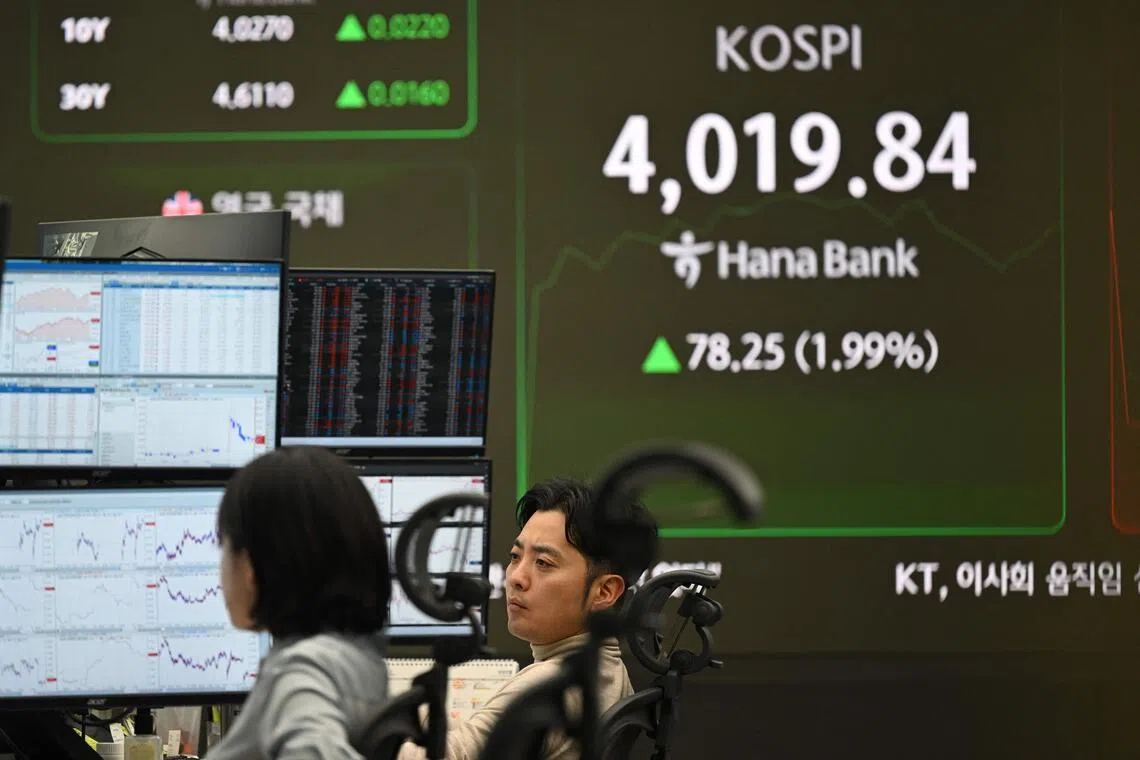South Korea’s economy posts fastest growth in 1½ years on solid exports, domestic demand
Sign up now: Get ST's newsletters delivered to your inbox

South Korea's benchmark stock gauge continued its blistering rally on Oct 27 to trade above the symbolic 4,000 level for the first time ever.
PHOTO: AFP
Follow topic:
SEOUL – South Korea’s economy grew in the third quarter by the fastest pace in 1½ years, helped by strong exports and solid private consumption as government stimulus measures boosted spending.
Gross domestic product (GDP) expanded by 1.2 per cent in the three months through September from the previous quarter, according to Bank of Korea (BOK) data released on Oct 28. The result topped the median estimate of 1 per cent growth. The economy grew 1.7 per cent from a year earlier.
The figures come ahead of this week’s Asia-Pacific Economic Cooperation summit in Gyeongju, South Korea, where US President Donald Trump and Chinese leader Xi Jinping are set to meet on Oct 30. South Korean officials hope the gathering will help generate momentum for progress in their own trade talks, with President Lee Jae Myung scheduled to meet Mr Trump on Oct 29.
Much of South Korea’s economic momentum now hinges on the outcome of trade negotiations with Washington, which have dragged on for about three months after an initial deal was signed in July. The two sides remain apart on how to structure a US$350 billion (S$453.5 billion) investment package underpinning the agreement to cap American tariffs on South Korean goods at 15 per cent.
The BOK estimated that US tariffs will trim growth by 0.45 percentage point in 2025, and 0.6 point in 2026. The bank raised its growth forecast to 0.9 per cent in August, a view in line with projections by the International Monetary Fund, which cited trade frictions and weak domestic demand as key challenges.
Still, South Korea’s exports have generally held up despite external headwinds. Early trade figures for the first 20 days of October showed a rebound driven by semiconductor exports, though autos and total shipments to the US declined sharply.
Demand for artificial intelligence-related memory chips remained a key driver. Exports overall rose 1.5 per cent, led by higher shipments of semiconductors and motor vehicles, while facility investment climbed 2.4 per cent on stronger demand for semiconductor manufacturing equipment, the BOK said in a statement.
Domestic demand also contributed to the momentum. The Lee administration’s extra budget of more than US$20 billion, which began filtering through the economy in July with two rounds of cash handouts, supported consumer spending and lifted private consumption during the quarter. Private consumption grew 1.3 per cent, with spending on both goods and services increasing, the BOK said.
In July, when the cash handouts were distributed, retail sales and department store sales advanced, and data earlier on Oct 28 showed that consumer confidence in October remained near historically high levels in October, signalling broad optimism among households. Meantime, the benchmark stock gauge continued its blistering rally on Oct 27 to trade above the symbolic 4,000 level for the first time ever.
BOK governor Rhee Chang Yong has said two extra budgets in 2025 would boost GDP by around 0.1 percentage point. While stimulus has helped lift activity, underlying risks from financial imbalances remain.
The central bank kept interest rates steady for a third straight meeting last week, citing risks tied to the housing market, household leverage and the currency.
President Lee highlighted the housing market concerns in an interview with Bloomberg TV late last week, describing real estate investment as “a very dangerous potential crisis, a ticking bomb”.
Apartment prices in Seoul have risen for 38 straight weeks as at Oct 20. Gains are concentrated in subway-accessible and redevelopment zones, with some deals closing above market rates despite repeated government interventions.
The Lee administration has announced three rounds of housing measures since June, including tighter loan rules and broader designations of speculative areas. The authorities are aiming to steer credit away from real estate and reduce systemic risks. BLOOMBERG

